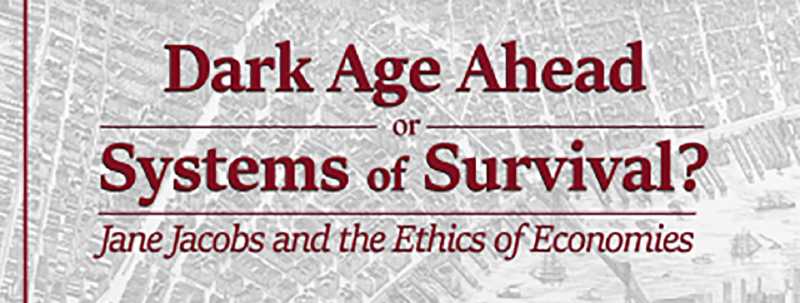
Are we headed for another “dark age,” or do the moral foundations of our commerce and politics possess the resources and resilience to rebound? Urban theorist and activist Jane Jacobs examined these questions in her later works, which we present in this exhibition drawn from her personal papers held in Burns Library.
Thirty years ago, in April 1987, Jacobs made the first of several visits to Boston College to participate in a symposium devoted to her work. The celebrated author of the revolutionary Death and Life of Great American Cities, who had waged legendary protests against plans to bisect Lower Manhattan with an expressway, was then at work on a new book, one that would probe the ethical underpinnings of civic and commercial life and economic systems.
Jacobs’s encounters with BC faculty and students—particularly those involved with BC’s PULSE Program for Service Learning—gave new form to her writing. They prompted her to turn precepts and prologue into a Socratic dialogue, with lively characters relating their insights into the two distinct ways that humans make a living: through trading or “raiding.” Their debate would yield a corresponding pair of implicit codes of conduct (“moral syndromes”) that can either foster healthy economic activity through a dynamic symbiosis, or, by unwittingly forming “monstrous hybrids,” threaten to doom civilization.
Systems of Survival: A Dialogue on the Moral Foundations of Commerce and Politics appeared five years later in 1992. Its key ideas and their development are presented here, along with Jacobs’s last book, Dark Age Ahead, published in 2004, just two years prior to her death at age 89.
Those not familiar with Jacobs or her earlier works will be introduced to a dissentious student from Scranton, Pennsylvania, who found her niche as an industrial and architectural journalist in New York City and advocated for her West Village neighborhood, then left it during the Vietnam War draft crisis to settle her family in Toronto. We will also discover what she said about urban renewal plans for Boston’s West End and historic preservation in its North End. And how a soup kitchen and Catholic Worker house founded 50 years ago in the South End has evolved into a model of social entrepreneurship and a vital community partner for BC’s PULSE Program, where Jacobs’s writings continue to be discussed in related Perspectives courses.
“We need continual but informal democratic explorations on the part of people who must thread their ways through governmental, business, or volunteer and grass-roots policies,” Jacobs wrote in her preface to Systems of Survival, “or must wrestle with the moral conflicts and ethical puzzles that sprout up unbidden in all manner of occupations.”
Jacobs bids all of us to dialogue, and discernment.
